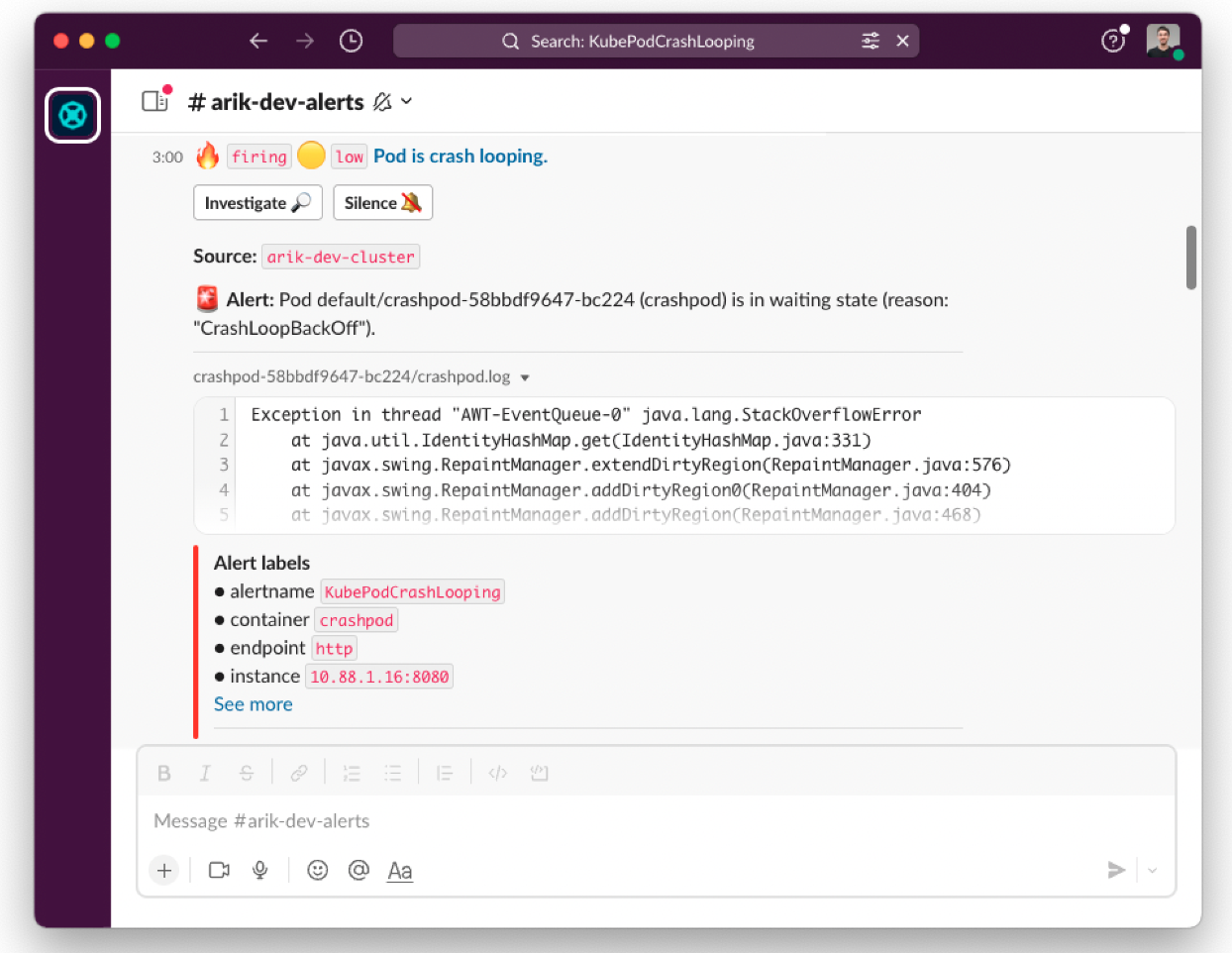Introduction To AIOps Tools
Modern DevOps, platform-engineering, and SRE teams drown in millions of metrics, logs, and alerts long before a real issue surfaces. AIOps platforms tame that torrent with large-language models and advanced analytics, turning raw telemetry into clear, prioritized signals—predicting outages, auto-triaging noise, and spotlighting the true root cause. By off-loading routine firefighting and recommending precise fixes, these tools let engineers spend more time on reliability strategy and less on reacting to page storms. Below, we dive into ten AIOps solutions leading this transformation.
How AIOps Benefits Engineering Teams?
AIOps tools bring a transformative approach to how engineering teams manage infrastructure and observability stack.
1. Tames alert storms
- Smart clustering & ML advice: Correlates duplicate or related alerts, ranks what truly matters, and proposes the next best action—cutting ticket volume and mean-time-to-resolve.
- Instant enrichment: Pulls logs, metrics, change data, and ownership into every alert so engineers see impact and likely fixes at a glance.
2. Automates the grind
- Workflow orchestration: Launches diagnostics, rollbacks, or escalations the moment a threshold trips—no 3-a.m. copy-pasting of commands.
- Adaptive automation: Runs in “recommend,” “confirm,” or fully “self-heal” modes, letting teams dial in the right level of autonomy for each service.
3. Protects budgets—and sanity
- Flexible licensing: Freemium tiers get you started quickly; enterprise plans add higher data caps, SSO, and compliance without surprise overages.
- Built-in cost insights: Many platforms surface wasteful resource spikes alongside performance anomalies, turning observability into savings.
Popular Tools for AIOps
In this section, we will cover some of the popular tools for AIOps and they are listed below:
PagerDuty
Moogsoft
Doctor Droid
BigPanda
Splunk IT Service Intelligence
Dynatrace
Datadog
LogicMonitor
Zabbix
AppDynamics
Tools
PagerDuty
Founded in 2009 and headquartered in San Francisco, PagerDuty stands as a leader in digital operations management.
Benefits

Company Overview: Founded in 2009 and headquartered in San Francisco, PagerDuty stands as a leader in digital operations management.
Benefits: Integrates machine learning to automate incident grouping and prioritization, enhancing real-time operations management.
Considerations
The cost escalates with increased usage, and its extensive features may overwhelm smaller teams.
Pricing
Starts at $10 per user/month with more advanced capabilities in higher-tier plans.
Relevant Links
Moogsoft
Since 2011, Moogsoft has been at the forefront of AIOps solutions, focusing on making IT operations smarter and faster.
Benefits

Company Overview: Since 2011, Moogsoft has been at the forefront of AIOps solutions, focusing on making IT operations smarter and faster.
Benefits: Excels in reducing noise through intelligent correlation and providing predictive insights.
Considerations
There's a significant learning curve to fully leverage all its features and achieve integration with existing tools.
Pricing
Custom pricing tailored to organizational needs.
Relevant Links
BigPanda AIOps
Launched in 2012, BigPanda specializes in AI-driven IT incident management automation.
Benefits

Company Overview: Launched in 2012, BigPanda specializes in AI-driven IT incident management automation.
Benefits: Automates responses to reduce manual tasks effectively and consolidates alerts into manageable incidents.
Considerations
Integrating with existing systems can be complex and time-consuming.
Pricing
Available upon request, customized to business size and requirements.
Relevant Links
Doctor droid
Doctor Droid uses AI investigations to reduce alert noise and surface true incidents, then fixes them faster with one-click runbooks. Plug it into your existing stack and spend minutes—not hours—getting from page to root cause.
Benefits

Company Overview: Doctor Droid is a SaaS AIOps platform that performs AI investigations to reduce noise in alerts, guiding engineers straight to root-cause insights while filtering out distracting chatter. Open-sourced Playbooks bring runbook automation to everyone, while the rest of the service is fully managed in the cloud.
Benefits:
Noise-cutting intelligence
— Correlates and prioritizes alerts so teams act only on what matters.
Plain-language root-cause reports
— Explains issues and recommends fixes, backed by logs, metrics, and traces.
One-click runbooks
— Automates common debug and remediation tasks across Slack, Datadog, AWS, Kubernetes, and more.
Considerations
Doctor Droid’s integration catalogue is growing rapidly; extremely niche or proprietary tools may still require a custom connector today.
Pricing
Free – Core alert inbox, AI investigations to reduce noise in alerts, and community Playbooks for small teams. Pro & Enterprise – Advanced correlation models, unlimited automated Playbooks, SSO/SCIM, dedicated support, and custom integrations (pricing on request).
Relevant Links
Splunk IT Service Intelligence
Splunk has been a significant name in the data processing and analytics arena, with its IT Service Intelligence (ITSI) module focusing on AIOps.
Benefits

Company Overview: Splunk has been a significant name in the data processing and analytics arena, with its IT Service Intelligence (ITSI) module focusing on AIOps.
Benefits: Known for its powerful analytics capabilities, Splunk ITSI uses AI to provide actionable insights and automate operations.
Considerations
The platform can be resource-intensive and requires a robust infrastructure.
Pricing
Pricing details provided upon request, based on the scale and specific needs of the user.
Relevant Links
Datadog
A leader in cloud-scale monitoring, Datadog provides comprehensive monitoring solutions across various platforms.
Benefits

Company Overview: A leader in cloud-scale monitoring, Datadog provides comprehensive monitoring solutions across various platforms.
Benefits: Features a robust AIOps functionality that includes real-time monitoring, automated problem detection, and incident management.
Considerations
May require considerable customization to align with specific operational workflows.
Pricing
Starts with a Pro plan at $15 per host per month, with enterprise-grade solutions available.
Relevant Links
LogicMonitor
LogicMonitor is a fully automated, cloud-based infrastructure monitoring platform that extends its capabilities into AIOps.
Benefits

Company Overview: LogicMonitor is a fully automated, cloud-based infrastructure monitoring platform that extends its capabilities into AIOps.
Benefits: Offers extensive automation in terms of resource discovery, monitoring, and alerting.
Considerations
Integration with legacy systems might require additional effort and configuration.
Pricing
Custom pricing based on the services used and the scale of deployment.
Relevant Links
Zabbix
Zabbix offers enterprise-class open-source monitoring for networks, servers, virtual machines, and cloud services.
Benefits

Company Overview: Zabbix offers enterprise-class open-source monitoring for networks, servers, virtual machines, and cloud services.
Benefits: Strong community support and no licensing cost make it an attractive AIOps tool for businesses looking to leverage open-source software.
Considerations
May lack some of the advanced AI features of proprietary tools.
Pricing
Free, as it is an open-source tool, but support packages are available for purchase.
Relevant Links
AppDynamics
Part of Cisco, AppDynamics delivers real-time performance monitoring solutions and business insights.
Benefits

Company Overview: Part of Cisco, AppDynamics delivers real-time performance monitoring solutions and business insights.
Benefits: Excels in full-stack observability combined with business analytics, providing a comprehensive view of IT infrastructure and its impact on business operations.
Considerations
The platform's extensive capabilities might require a steep learning curve and significant resources to manage effectively.
Pricing
Offers a variety of pricing options, details of which are provided upon request.
Relevant Links
Robusta

Founded in 2021 and headquartered in Tel Aviv, Robusta delivers an agentic-AI observability and incident-response platform built specifically for Kubernetes and Prometheus workloads.
Benefits
Reduces alert-troubleshooting time by up to 80 percent with “Fix alerts 85 % faster” agentic AI; automatically enriches Prometheus alerts with logs, graphs, and recommended runbooks; supports unlimited clusters and more than 13 chat/Ops integrations out of the box.
Considerations
Robusta shines when you already run Kubernetes + Prometheus—teams on other stacks may see less value. Pricing is usage-based ($/pod/hour), so costs can grow with very large fleets, and advanced AI/SSO/RBAC features sit behind the paid Pro and Enterprise tiers.
Pricing
They have Opensource and On-prem version
Conclusion
AIOps tools are no longer just a nice-to-have for engineering teams; they are a necessity in managing modern IT environments that are increasingly complex and data-driven. By choosing the right AIOps tool, teams can enhance their operational efficiencies, reduce downtime, and improve their ability to respond to incidents.
The platforms listed here represent some of the best in the industry, each with unique strengths that can cater to the diverse needs of IT operations across various industries. Whether your team is looking to automate routine tasks, reduce incident response times, or leverage AI-driven operational insights, there is an AIOps solution that can meet your requirements.
Ready to cut the alert noise in 5 minutes?
Install our free slack app for AI investigation that reduce alert noise - ship with fewer 2 AM pings
Frequently Asked Questions
Everything you need to know about observability pipelines

